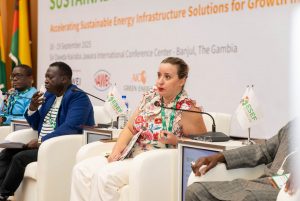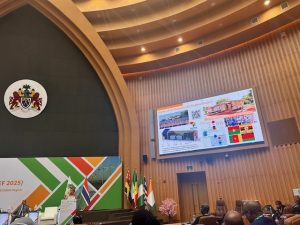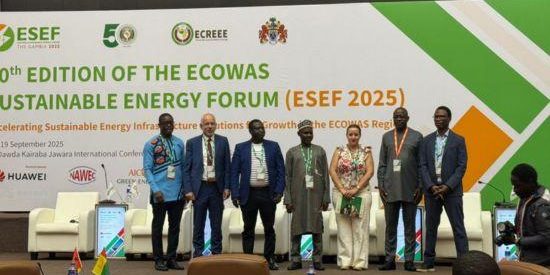The SophiA project was presented at the 10th edition of the West African Sustainable Energy Forum (ESEF 2025), organised by the ECOWAS Centre for Renewable Energy and Energy Efficiency (ECREEE). The event took place on 18–19 September 2025 at the Sir Dawda Kairaba Jawara International Conference Center in Banjul, The Gambia, marking not only a decade of ESEF but also the 15th anniversary of ECREEE and the 50th anniversary of ECOWAS.
Held under the theme “Accelerating Sustainable Energy Infrastructure Solutions for Growth in the ECOWAS Region,” the forum gathered more than 500 participants, including ministers, diplomatic organisations, national experts, private sector leaders, development partners, innovators, and civil society representatives to deliberate on the acceleration of West Africa’s transition to sustainable energy.
The programme addressed key topics such as clean cooking, mini-grids, climate-resilient cooling, sustainable mobility, and the energy-water-food nexus.
On this occasion, SophiA was represented by the International Institute of Refrigeration (IIR). IIR Director General Dr. Yosr Allouche and Ina Colombo (Head of EU and International Programmes) participated in high-level plenary sessions.
-
Day 1, Session 2: Energy Efficiency for Sustainable Livelihoods in Africa (moderated by UNIDO)
Dr. Allouche called on ECOWAS governments to adopt clear roadmaps for phasing down high-GWP refrigerants in line with the Kigali Amendment, enforce minimum energy performance standards (MEPS), and harmonise technical regulations, particularly for the safe use of flammable refrigerants. She emphasised the transformative role of sustainable refrigeration and cold chains in reducing food losses, boosting farmers’ incomes, and strengthening healthcare resilience.


- Day 2, Session 1: Powering Food Systems in West Africa (moderated by the Gambian Minister of Energy)
Dr. Allouche highlighted that refrigeration and cold chains account for around 20% of global electricity use and 7.5% of CO₂ emissions, but are vital for food security, healthcare, and climate resilience. She showcased the SophiA project alongside other initiatives such as INDEE+ as concrete examples of sustainable technologies tackling food waste and energy challenges.

As part of the events leading up to the forum, on 17 September a dedicated session on Climate-Resilient Cooling, Climate Change, and Gender was organised with the support of the EU-funded projects SophiA, AgriCOOL, and EMERGE. Moderated by ECREEE’s Dr. Charles Diarra, the session fostered vibrant discussions on how innovative and inclusive refrigeration solutions can respond to climate, energy, and social challenges across West Africa. On this occasion, SophiA showcased its advances in climate-resilient refrigeration technologies across four pilot countries.

The IIR also used the opportunity to strengthen ties with potential and existing member countries, securing commitments for future collaboration and further promoting the role of refrigeration as a driver for both sustainable development and climate action in Africa.












